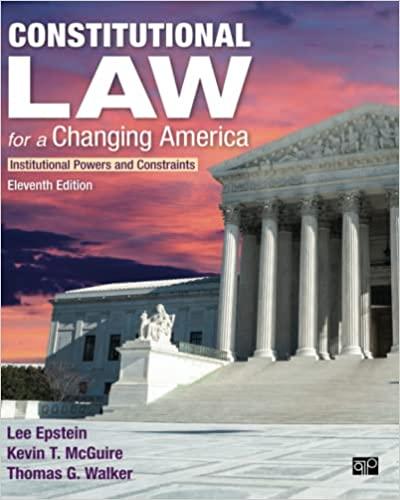Question
Case 17.3 Hubbert v. Dell Corporation 835 N.E.2d 113, 2005 Ill. App. Lexis 808 (2005) Appellate Court of Illinois The blue hyperlinks on the defendant's
Case 17.3
Hubbert v. Dell Corporation
835 N.E.2d 113, 2005 Ill. App. Lexis 808 (2005) Appellate Court of Illinois
"The blue hyperlinks on the defendant's web pages, constituting the five-step process for ordering the computers, should be treated the same as a multipage written paper contract."
Hopkins, Justice
Facts
Plaintiffs Dewayne Hubbert, Elden Craft, Chris Grout, and Rhonda Byington purchased computers from Dell Corporation online through Dell's website. To make their purchase, each of the plaintiffs completed online order forms on five pages on Dell's website. On each of the five pages, Dell's terms and conditions of sale were accessible by clicking on a blue hyperlink. To find the terms and conditions, the plaintiffs would have had to click on the blue hyperlink and read the terms and conditions of sale. On the last page of the five page order form, the following statement appeared: "All sales are subject to Dell's Terms and Conditions of Sale."
The plaintiffs filed a lawsuit against Dell, alleging that Dell misrepresented the speed of the microprocessors included in their computers they purchased. Dell made a demand for arbitration, asserting that the plaintiffs were bound by the arbitration agreement that was contained in the terms and conditions of sale. The plaintiffs countered that the arbitration clause was not part of their web contract because the terms and conditions of sale were not conspicuously displayed as part of their web contract. The trial court sided with the plaint
Cyber-squattingis an issue that can affect businesses and famous people. Read case 17.3 in your text. Identify another case dealing with cyber-squatting or a domain name dispute in the last two years. Answer the questions below.
- Compare and contrast the facts in both cases.
- How was the Anti Cyber-squatting Consumer Protection Act applied in these cases?
- Present an argument to support a person who purchased a domain name years before the name became famous. Should they be found guilty of cyber-squatting?
- Present an ethical argument for both parties in these cases.
Step by Step Solution
There are 3 Steps involved in it
Step: 1

Get Instant Access to Expert-Tailored Solutions
See step-by-step solutions with expert insights and AI powered tools for academic success
Step: 2

Step: 3

Ace Your Homework with AI
Get the answers you need in no time with our AI-driven, step-by-step assistance
Get Started


